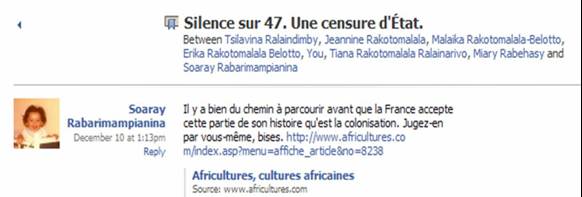Plans for a theater performance to commemorate a historical date in Madagascar's battle for independence have been cancelled without explanation by French authorities.
The play, co-produced by CulturesFrance [1], was to supposed to be performed in Alliance Française cultural centers in Comoros, Mauritius, Reunion and elsewhere, but the Ministry of Foreign Affairs has since withdrawn from the agreement.
March 29, 1947 brings back traumatic memories to many older Malagasy citizens. It is the day the French army violently crushed one of the first struggles for independence in their former colonial empire [2]. The uprising resulted in the death of 30,000 to 100,000 people (the actual number of casualties is still being discussed [3]among historians).
Despite recognition of the massacre as a war crime in 1951 and of unacceptable repression in 2005 by the French government, the 1947 events are still relatively unknown both in Madagascar and internationally. To shed more light on the tragedy, a renowned Malagasy writer, Jean-Luc Raharimanana [4] and a French director, Thierry Bedard, came together to produce a play entitled “47 [5]” (fr) that reenacts the unfolding of the events, and discusses the complex relation between colonial rulers and the indigenous population.
Below is a short clip from the play:
After a few performances in two French metropolitan cities, further performances in the southern Africa and the Indian Ocean have been cancelled [8] (fr) by the French Department of Foreign Affairs and Development.
The creator of the play, Jean-Luc Raharimanana, reacts strongly [9] to the decision on the Rue89 [10] blog (fr):
Silence pèse sur la mémoire. Les langues se délient. Des hommes et des femmes voudront comprendre. Dans ce désir, réel cette fois-ci, de vivre ensemble[..] Pourquoi en 47, deux ans après le carnage, deux ans après le « plus jamais ça», pourquoi à Madagascar s’est perpétré l’un des plus grands massacres coloniaux ? [..] C’est ce silence qu’explore le spectacle “47”. Une histoire commune. Violente. Sensible. Un théâtre qui nous ramène dans ce désir de vivre ensemble, de comprendre ce qui a déchiré, les corps malmenés et torturés, les paroles étouffés et les non-dits qui corrompent les âmes.[..] Mais ainsi en a décidé le “bureau politique” de la DGCID1. Censure sur le spectacle. Interdiction d’emmener cette parole dans les centres culturels africains et alliances françaises. [..] Mais la mémoire se moque bien de la censure même si c’est une censure d’Etat. Le désir est profond de comprendre d’autant plus que nous avons maintenant le recul nécessaire pour tout entendre, pour enfin échanger.
A few bloggers [11] reported news of the ban on their blogs [12]. Reactions in the comment section [13]of the entry by Raharimanana vary between indifference and outrage.
A few, do not see the need to rehash the past. Mechante Langue [14] asks (fr):
Ne jouez pas les faux martyrs. Sinon serieusement vous croyez vraiment que la chose la plus importante à denoncer a Madagascar aujourd hui , ce sont les massacres de 47 ..sérieusement ?
To which Monsieur Lambda [15] replies (fr):
Il vous échappe manifestement que ces massacres sont, dans une large mesure, fondateurs de la conscience nationale des Malgaches et qu’ils occupent, du point de vue de la mythologie nationale, une place comparable à celle de la prise de la Bastille pour les Français.
Juan Pablo de Tagéna [16] thinks that Malagasy people may rethink whether the colonial struggle was worth it (fr):
Aujourd’hui les Malgaches ne demanderaient pas leur indépendance: ils seraient à 99% pour le maintien dans la Communauté Française.
On facebook [17], a private conversation thread that discusses the ban, Soaray Rabarimampianina [18] (quoted with permission) thinks that there is still much to be done for that part of history to be discussed openly.

Il y a bien du chemin à parcourir avant que la France accepte cette partie de son histoire qu'est la colonisation.
In the same thread, Tsilavina Ralaindimby [19] points out that when discussing the colonial period, one should never forget the soldiers form the colony who fought for France in both world wars (fr):

C'est un documentaire sur les Tirailleurs Malagaches qui sont venus pour se battre au nomb de la France en 14/18 et dont beaucoup sont morts là-bas. A Menton [..] il y a là-bas un cimetière avec toute une rangée de tombes de soldats malgaches.
Jentilisa [20] contributed links and references for this post.